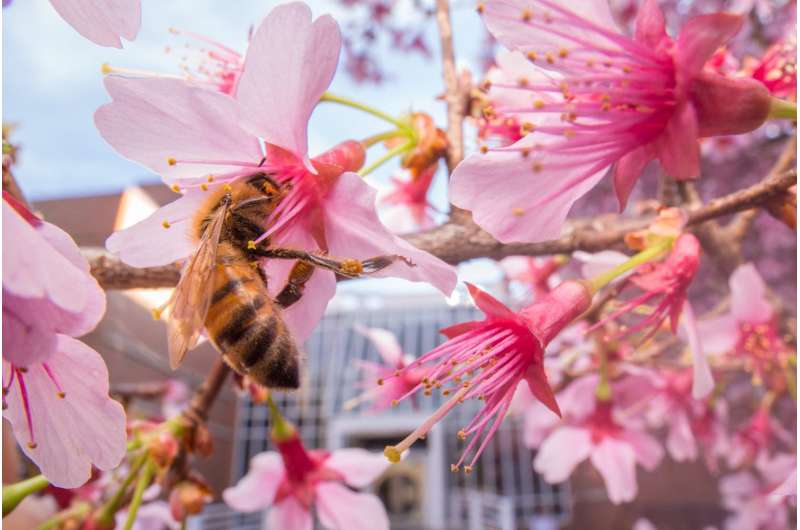No junk-food diet: Even in cities, bees find flowers and avoid processed sugars

New research from North Carolina State University finds that bees in urban areas stick to a flower-nectar diet, steering clear of processed sugars found in soda and other junk food.
"Urban habitats are growing, as is urban beekeeping, and we wanted to see if bee diets in cities are different from those in rural areas," says Clint Penick, a postdoctoral researcher at NC State and lead author of a paper on the study. "For example, we wanted to know if there are even enough flowers in urban areas to support bee populations, or if bees are turning to human sugar sources, like old soda."
To find out, the researchers collected worker honey bees (Apis mellifera) from 39 colonies across rural and urban areas within 30 miles of Raleigh, North Carolina. Twenty-four of the colonies were managed by beekeepers; the remaining 15 colonies were feral.
The researchers then analyzed the carbon isotopes in the bee samples to determine what proportion of their diet came from processed sugars—like table sugar and corn syrup—as opposed to flower nectar.
Animals, including bees, incorporate the carbon from food into their bodies. One type of carbon, carbon-13, is associated with grasses such as corn and sugar cane. Researchers can tell how much processed sugar bees consume by measuring each bee's carbon-13 levels. The researchers took a similar approach in a previous study that evaluated the diet of ants in New York City.
Because beekeepers often supplement their bees' diet with sugar water, researchers anticipated that domesticated bees would show that a significant proportion of their diet came from processed sugar—especially in urban areas, where the bees would have easy access to soda cans, garbage and other sources of processed sugar. The researchers also predicted that feral bees in rural areas would show virtually no processed sugar in their diet, but that feral bees in urban areas would show evidence of consuming processed sugars.
To their surprise, the researchers found that there was no evidence that urban bees consumed more processed sugar than their rural counterparts. However, domesticated bees did show evidence of consuming significantly more processed sugar than feral bees in both urban and rural environments, which is likely due to beekeepers supplementing their bees' diet with sugar.
"Basically, bees are relying on flowers in cities and are not turning to human foods to supplement their diet," Penick says. "This is good news for urban beekeepers. The honey in their hives is mostly coming from flower nectar and not old soda, which is what we originally guessed."
However, it's not clear if this would hold true for the biggest cities.
"Our findings are based on research in a mid-sized city," Penick says. "Even the most urban areas of Raleigh have more than 50 percent open green space. By comparison, the average site in New York City has only 10 percent green space. So more work needs to be done to evaluate bee diets in our largest cities."
More information: Clint A. Penick et al, The contribution of human foods to honey bee diets in a mid-sized metropolis, Journal of Urban Ecology (2016). DOI: 10.1093/jue/juw001
Provided by North Carolina State University





















